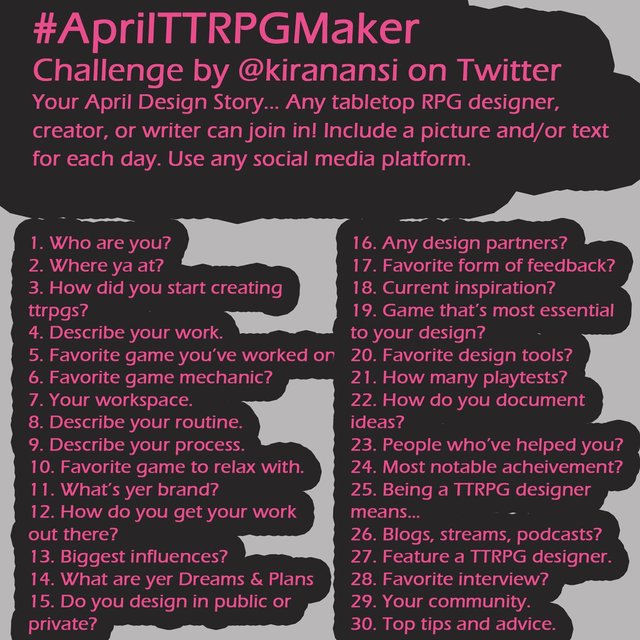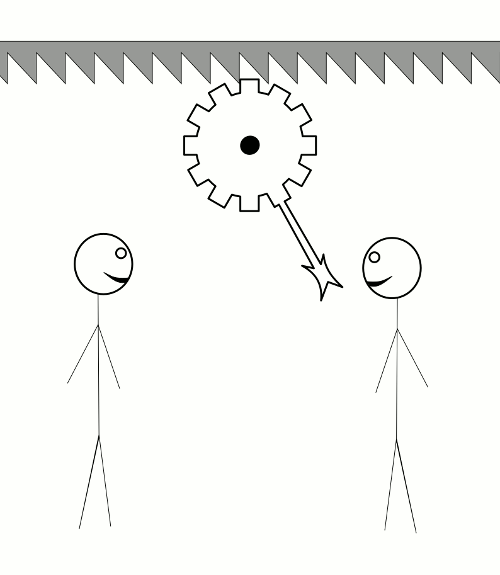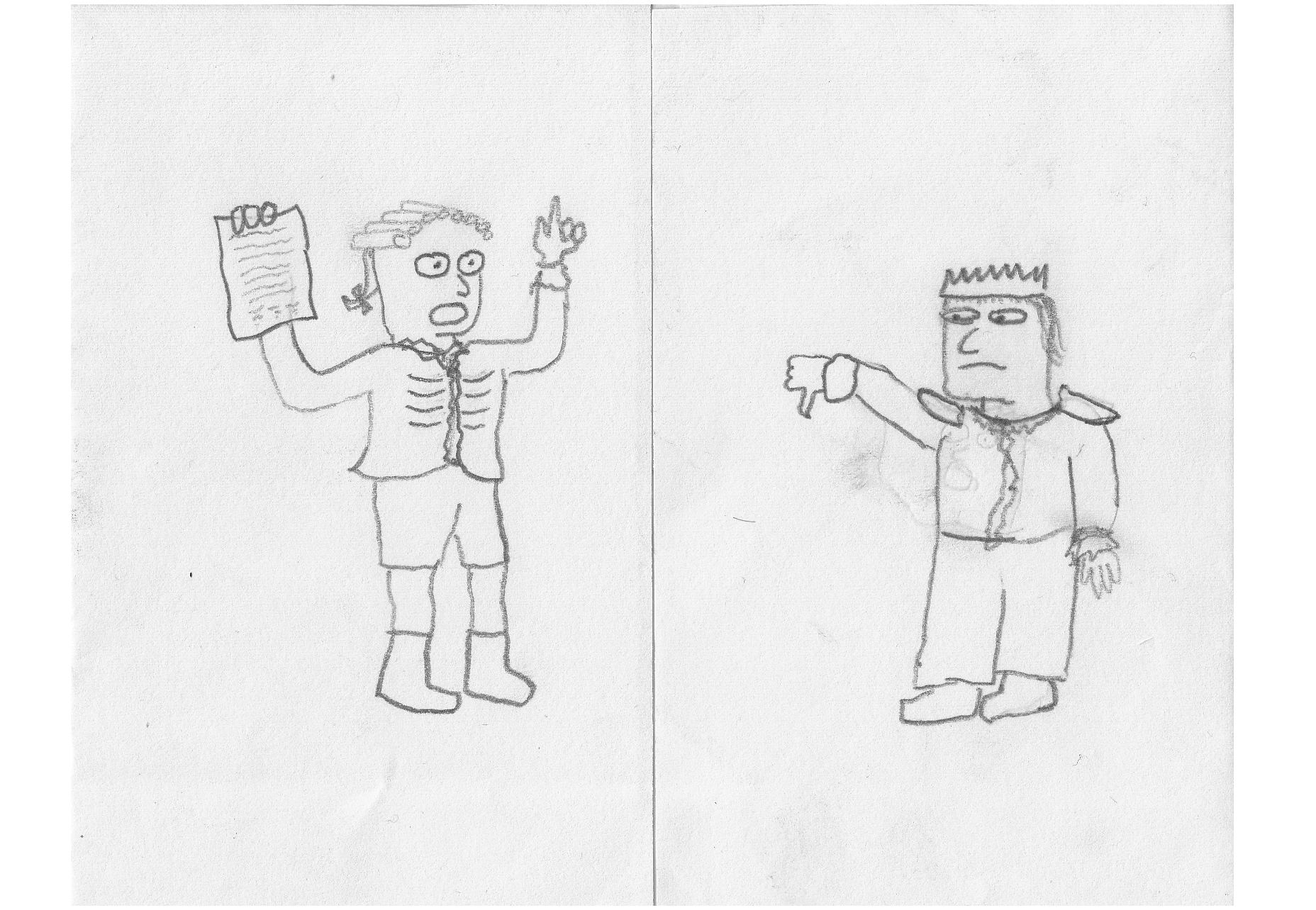AprilTTRPGMaker Day 4: Describe your work.
4. Describe your work.
If you'd like an overview of some of my game design projects, I covered that in this post a few months ago, so I'll get a bit more abstract with this question. There are a couple of metaphors/ideas I think about when thinking about game design.
Games are machines
The biggest metaphor for game design that I use is that I'm building a machine where human minds and the contributions they make are important parts.
The humans can't exist solely at an input or output point, in order for the thing to be a game the humans need to be part of the system. There's a Forge-ism that game design is about getting people to “say interesting things”. I think that misplaces things a bit, the things people say are primarily a downstream consequence of what they're thinking. The important action of a game happens inside people's heads. The “parts” of the machine are ideas and concepts. When I'm designing a game I try to think about where the players minds are at, what things are pushing/pulling on them and what things they're pushing/pulling on.
Meaningfulness, self-expression, and signaling
I think the thing that makes games feel fun is when you're making a meaningful contribution to the game-state. I suspect feelings of meaningfulness happen when people feel like they're being part of a larger whole. So, some consequences of that: You don't want the contribution to be so trivial that it's “sub-threshold” and seems like it has zero influence on the game state. You don't want it to be so massive that it overwhelms and overwrites the previous game-state. And the contribution needs to feel like it's uniquely tied to you, you're not merely the medium enacting some “external” program. The example I like to use to illustrate that isn't an RPG, but my drawing game Four Panels – on each round you're contributing some of your own art that's building on what is already there. I think that “core loop” has a lot in common with the Forge concepts of “Narrativist” or “Simulationist” games – your meaningful contributions as a player are when you “say something” that builds on and transforms the story.
While “aesthetic” stuff like descriptions or creative actions are great at serving that purpose in an RPG design, it's something that happens in all games, but sometimes the self-expression happens through “signaling” effects. When somebody says something like “I'm going to Worcester”, they're not only sending information about the core content but also about other things, such as what they think the proper pronunciation of “Worcester” is. In a game of chess when you make your move you're updating the game state, but you're also sending the signal “I think this is a good move for a player in my current position”, you're expressing yourself through your strategy. That kind of self-expression-through-signaling also happens in RPGs. For example, even in a traditional combat-heavy game a GM can send some signals about their aesthetic priorities by what they decide to describe in detail and what they decide to communicate in spare, functional ways. Humans are social animals and almost everything we do can be interpreted as some sort of signal. Part of game design is priming the players for what signals to pay attention to.
Structuralism
Although there's a stereotype of StoryGames that they use rules and procedures to replicate recognizable story genres or structures, I think actual examples of games that work like that are pretty thin on the ground. But it's definitely an area that some of my games fit into, such as Final Hour of a Storied Age being my attempt to build a game around the plot structure of Epic Fantasy literature, or Getting There in Time which is my attempt to build a game around how a good episode of Doctor Who should work. I think of this as “structuralism”, in contrast games which just leverage classic RPG play structures and don't worry too much about whether the actual play of the game has much relationship to the way stories in the genre work. You can play a D&D-esque game in Middle Earth, but if you do it won't feel a lot like The Lord of the Rings.
The list of questions for #AprilTTRPGMaker

(image from Kira Magrann's twitter)


I kinda get what you're going for with the emphasis on players' thoughts (insofar as we can consider what a player's attention, anticipation, feelings, etc. might be), but it seems like a strange target for design. After all, thoughts aren't observable; a game where we sit and think at each other would be both dull and incomprehensible! Game design may be mind control, per the Vincent Baker quote, but we can only judge the success of our mind control attempt by what people do under our games' influence.
Sure, in order to judge what people are thinking or feeling we have to infer from behavior, etc. Just because we can't directly access people's minds doesn't mean that's not where the actual important stuff is happening. For example, a lot of the interesting stuff in Dogs in the Vineyard is the tension you feel as you weigh whether and how to escalate, how much you care about winning, how far you're willing to go, etc. I think treating people's minds like black boxes is a dead end for game design and RPG Theory. Even in a game like chess the stuff happening on the board is just the medium, the actual game stuff is happening in the heads of the players.
Man, I told myself I wouldn't write anything long for this one, and then I did https://steemit.com/@loreshapergames/ttrpg-creator-challenge-day-4-describe-your-work. Figured you might be interested since we've been doing this simultaneously.
if you want more upvotes check out my last blog post @a-0-0